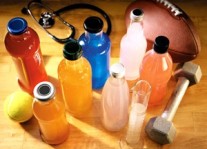Variety of Options for Athletic Recovery Drinks
- < Back to Articles
- March 13, 2014

In the quest for performance and fitness, athletes and the public often turn to recovery drinks for a boost. Research into this area has generated useful information that can guide optimal consumption of these drinks.
Recovery drinks should include an adequate amount of carbohydrates to maximize recovery as well as protein. The optimal ratio of carbohydrate to protein is about 2:1, typically 0.8 g of carbohydrate and 0.4 g of protein per kilogram per hour for 4 to 6 hours. For example, a 20 oz bottle of Gatorade, has 34 g of carbohydrate. A 176 lb athlete should drink approximately two Gatorades per hour to meet the carb recommendations.
Electrolytes are also important, with an optimal concentration of 0.3 to 0.7 g of sodium per liter.1 The 20 oz bottle of Gatorade has 270 mg of sodium at a concentration of just over 0.45 g per liter. Recovery drinks are not limited to specially formulated beverages, however. Coconut water has been shown to be similar to commercial recovery drinks. More recently, chocolate milk has been shown to be as effective, and perhaps more effective, as a recovery drink. Other commercial drinks with higher protein content are coming on the market. However, the use of specific amino acids and antioxidants has not been proven to be particularly effective although research is ongoing.
A closely related topic is the consumption of energy drinks such as Red Bull or Full Throttle. While the consumption of caffeine, more traditionally in the form of coffee or tea, has long been known to have potential benefits for performance, recently there has been a significant increase in the consumption of specially formulated energy beverages for athletes and the general public. These are often displayed in the same area as sports recovery drinks but are not the same product. The benefits are less well established and the risks greater with energy drinks, particularly related to heart issues. Recent recommendations from the Mayo Clinic do not support the use of energy drinks during sporting activities.
Research is ongoing into how drinks can provide optimal benefit while minimizing potential health risks. However, the use of both recovery and energy drinks is more often driven by advertising than science. Athletes and the general public should use caution when interpreting claims about the advantages of specific drinks. Nevertheless, commercial sports drinks as well as chocolate milk can be a healthy, helpful addition to speed recovery and improve performance..



